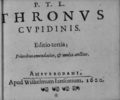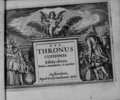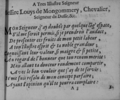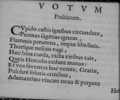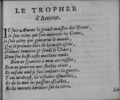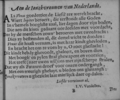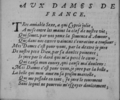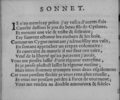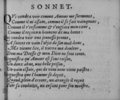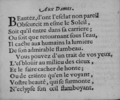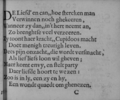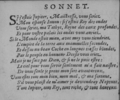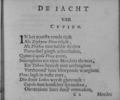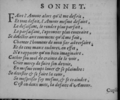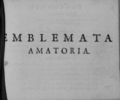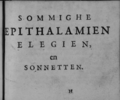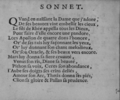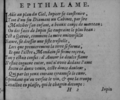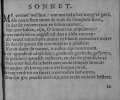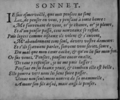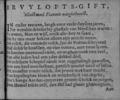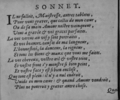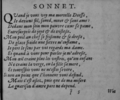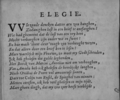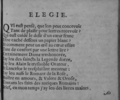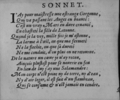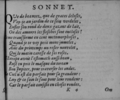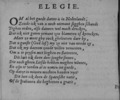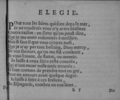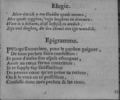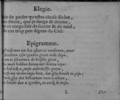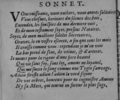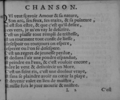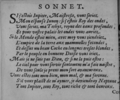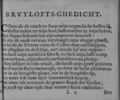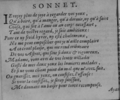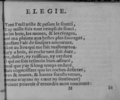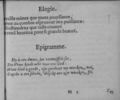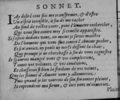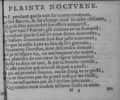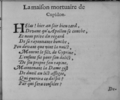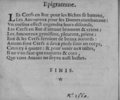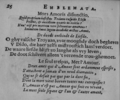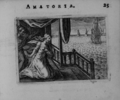Mors Amoris disiunctio [24]

Quid proprium infestas Troiano cuspide Elisæa1
Pectus, & auxilium quæris in exitio?
Heu! nisi per mortem veri solvuntur amantes:
Immitem hanc legem condidit arctus Amor.
Pectus, & auxilium quæris in exitio?
Heu! nisi per mortem veri solvuntur amantes:
Immitem hanc legem condidit arctus Amor.

De doodt ontbindt de Liefde.
O ghy valsche Troyaan, vvat mooghdy doch begheven
V Dido, die haer zelfs mistroostich laas! verdoet.
De waare liefde blijft zo langhe als vvy leven;
De doot schilvert alleen 't vereende trou-ghemoet.
V Dido, die haer zelfs mistroostich laas! verdoet.
De waare liefde blijft zo langhe als vvy leven;
De doot schilvert alleen 't vereende trou-ghemoet.
Le seul trespas, Met l'Amour.
Deux ames qui d'Amour sont ardamment esprises,
S'attachent a jamais d'un neud diamantin,
Qui ne se defait pas que par la dure fin,
Dont la mort vient borner toutes nos entreprises:
L'Amour n'est pas Amour qui finit en vivant,
La mort seule separe & l'un & l'autre amant.,
S'attachent a jamais d'un neud diamantin,
Qui ne se defait pas que par la dure fin,
Dont la mort vient borner toutes nos entreprises:
L'Amour n'est pas Amour qui finit en vivant,
La mort seule separe & l'un & l'autre amant.,
Translations
 |
Death is separation from love. |
 |
Why do you threaten your own breast with a Trojan lance, Elisaean woman? |
Literature
Sources and parallels
References, across this site, to this page:
No references to this emblem or page found.Iconclass
Looking at the ships sailing away with Aeneas and his men, Dido is about to plunge herself on Aeneas's sword; her sister Anna approaches- breasts (+ nude human being)
[31A2223(+89)]

- kneeling on both knees - AA - female human figure
[31AA2331]

- running - AA - female human figure
[31AA27112]

- looking upwards (+ being sad, suffering, sorrowing)
[31B6211(+941)]

- looking upwards (+ being bitter)
[31B6211(+942)]

- looking upwards (+ being tormented)
[31B6211(+943)]

- violent death by sword (+ suicide out of despair)
[31E234631(+72)]

- loggia, verandah, porch
[41A381]

- sisters (second degree family relationships)
[42G2222]

- crown (symbol of sovereignty)
[44B191]

- ships (in general) (+ departure; weighing anchor)
[46C21(+62)]

- proverbs, sayings, etc. (with TEXT)
[86(MORS AMORIS DISIUNCTIO)]

- death of Dido; she climbs the funeral pyre and falls upon the sword of Aeneas (+ variant)
[96B332(+0)]

Comments
commentaryNotes
Elis(s)a, another name for the queen of Carthage, Dido, when according to myth, more especially Vergil's Aeneid, Aeneas met
her, had a brief affair with her, then left her. When Dido realised that her lover would not stay, she committed suicide.
![[H O M E : Emblem Project Utrecht]](/static/images/rd-small.gif)
